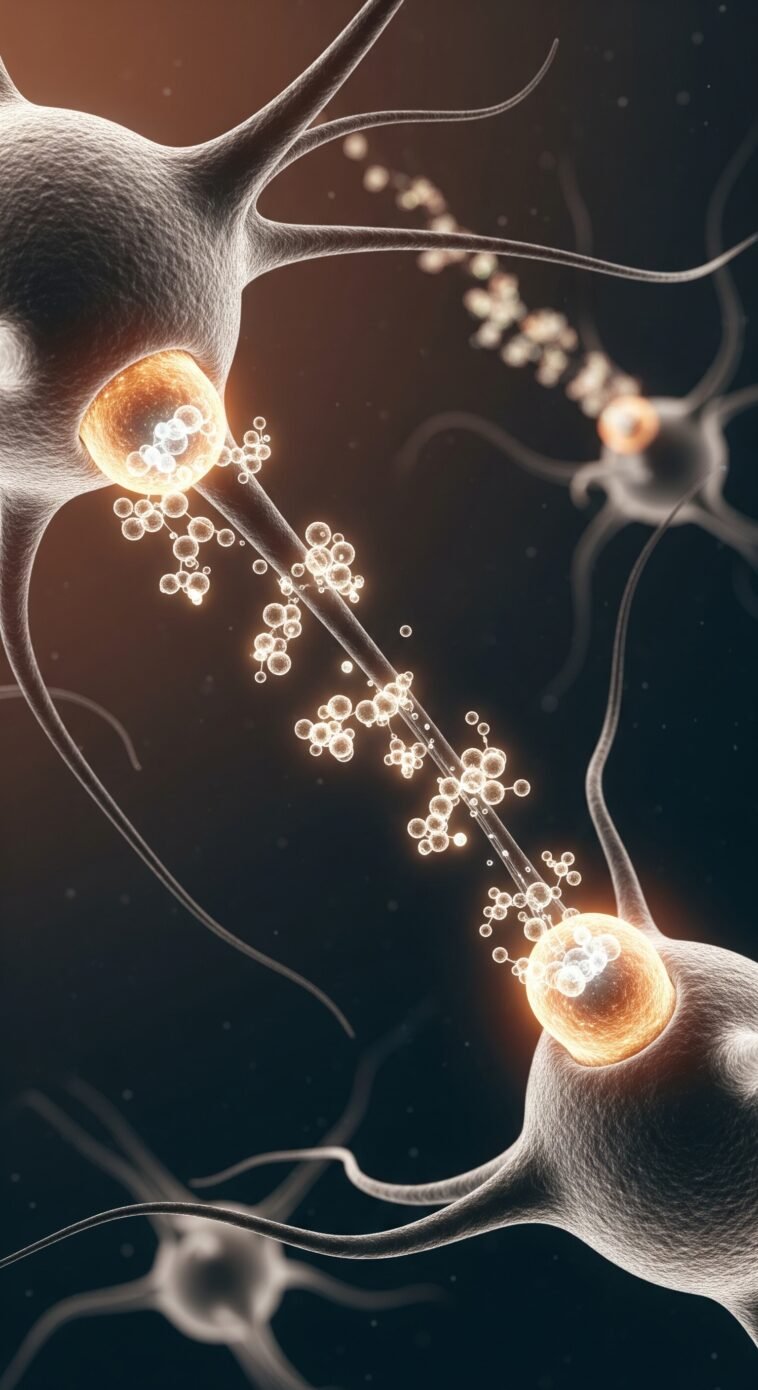
Ever notice how sunshine or your favorite meal can boost your mood?
That’s serotonin doing its thing.
It’s often called the “happy chemical,” but it’s more than that—it affects your mood, sleep, appetite, and more.
This quick guide breaks down what serotonin actually does, how to tell if your levels are off, and simple, science-backed ways to boost it naturally—no hype, just real stuff that works.
What Is Serotonin? Understanding Your Body’s Master Mood Regulator
People think of it as the “feel-good” brain chemical—and yeah, it does affect mood—but that’s just one part of the story.
Most of it (about 90%) is actually made in your gut, not your brain. Wild, right?
That’s why serotonin isn’t just about emotions.
It also plays a role in digestion, sleep, appetite, and even how your body reacts to pain.
Basically, it’s a signal system your body uses to keep things running smoothly, from your head to your stomach.
It all starts with tryptophan—that’s an amino acid you can’t make on your own, so you have to get it from food.
Once it’s in your body, it gets turned into serotonin through a few chemical steps.

The Multifaceted Functions of Serotonin: More Than Just Mood
Mood and emotional regulation
Serotonin gets a lot of credit for helping with mood—and that’s mostly fair.
When levels are balanced, you’re less anxious, more even-keeled, and feel generally okay.
But let’s not oversimplify it.
That whole “low serotonin causes depression” theory? It’s outdated.
Depression’s way more complicated.
It’s not just one chemical being off—it’s a whole system of brain and body functions that aren’t syncing well.
Serotonin helps, but it’s one piece of a big puzzle.
Sleep-wake cycle management
Your body uses serotonin to keep your daily rhythm running right.
During the day, it helps you stay alert. At night, it turns into melatonin, the hormone that tells your body to wind down.
If you’re not sleeping well—can’t fall asleep, keep waking up, or just feel tired all the time—your serotonin system might be out of whack.
Digestive system harmony
Here’s something people don’t always realize: about 90% of your serotonin is made in your gut.
It helps move food through your digestive system and tells your brain when you’re full.
This also explains why gut issues and mood issues often show up together.
Your gut and brain are in constant contact. Mess with one, and the other usually reacts.
Cardiovascular and blood functions
Serotonin doesn’t just hang out in your brain. It’s also stored in your blood platelets.
When you get hurt, those platelets release serotonin to help stop bleeding.
It also helps regulate blood pressure and keeps your heart and blood vessels working smoothly.
Cognitive performance and memory
Serotonin plays a role in learning, memory, and decision-making.
Balanced levels make it easier to focus, think clearly, and remember stuff.
It also helps you connect emotions to memories—like learning from past mistakes or remembering what made you feel good or bad in certain situations.
Recognizing Serotonin Imbalance: Signs and Symptoms
Serotonin helps with mood, sleep, digestion, and more.
When it’s not working right, you can feel it—but it’s not always easy to tell if serotonin is the main problem.
These signs can point to an imbalance, but they could also be caused by other things.
If they stick around, it’s worth talking to a doctor.
Signs of low serotonin levels
Emotional and mental symptoms:
- You feel down most of the time
- You’re more anxious than usual
- Little things irritate you more than they should
- It’s hard to enjoy things, even stuff you used to love
- You feel overwhelmed easily
- Negative thoughts keep looping
Physical and sleep-related symptoms:
- You can’t fall asleep or keep waking up
- You’re tired even after resting
- Your appetite changes a lot—more cravings or not hungry at all
- You’ve got stomach issues or weird digestion
- You feel more sensitive to pain
- Headaches come and go without a clear reason
Cognitive and behavioral symptoms:
- You’re spaced out or have trouble focusing
- Your memory’s fuzzy
- You don’t feel motivated
- You pull away from people more than usual
- You get stuck in habits or cravings (scrolling, sugar, etc.)
When serotonin levels are too high
This doesn’t happen often on its own.
It’s usually caused by certain meds or mixing meds and supplements.
It can be serious—called serotonin syndrome—and needs quick medical care.
Warning signs:
- You feel confused or restless
- Your heart’s racing
- Your muscles feel stiff or twitchy
- You’re sweating or hot even in a cool room
- Your blood pressure’s way up
- You feel off in a way that’s hard to explain
If this ever hits out of nowhere and you’re on meds that affect serotonin, don’t wait—get medical help fast.
It can get dangerous quickly.

Science-Backed Ways to Naturally Boost Serotonin Levels
You can’t control everything, but you can do a lot to support your serotonin levels. Think habits, not hacks.
Here’s what actually helps, without the fluff:
1. Exercise: Your natural serotonin booster
Exercise helps your brain make more serotonin.
It also helps tryptophan (the stuff your body uses to build serotonin) get into your brain.
What works best:
- Jogging, biking, swimming—anything that gets your heart going
- Lifting weights or bodyweight training
- Yoga or tai chi if you want movement + calm
- A brisk walk outside (sunlight adds extra benefits)
Don’t overthink it. You don’t need to train like an athlete.
Just aim for 30 minutes most days. Doesn’t have to be intense—just consistent.
2. Nutrition: Feeding your serotonin production
You can’t eat serotonin directly, but you can feed the system that makes it.
Tryptophan-rich foods (your starting material):
- Turkey, eggs, salmon, tofu, cheese
- Pumpkin seeds, walnuts, sesame seeds
- Lentils, chickpeas, black beans
- Whole grains like oats and brown rice
Other nutrients that help:
- Carbs (especially whole grains): help tryptophan reach your brain
- Omega-3s: found in fish, flaxseeds, walnuts
- B vitamins (esp. B6): in bananas, potatoes, leafy greens
- Magnesium: in dark chocolate, avocados, spinach
Tip: Pair protein with a bit of carbs (like eggs + toast) to help tryptophan do its thing.
3. Light exposure and seasonal considerations
Your brain needs light to make serotonin.
Sunlight tells your body, “Hey, it’s daytime. Let’s make stuff.”
Here’s what helps:
- Step outside within an hour of waking—15–30 mins is solid
- Keep indoor spaces bright during the day
- In winter, a light box (10,000 lux for 20–30 mins) can help
- At night, cut back on screens or use blue light filters—this helps your serotonin turn into melatonin
You don’t need to live at the beach. Just find your daily sunlight window.
4. Stress management and mental health practices
Chronic stress lowers serotonin.
You can’t remove all stress, but you can shift how your body handles it.
Try these:
- Meditation or breathwork—even 5–10 mins helps
- Progressive muscle relaxation (tense then release muscles)
- Journaling—just brain-dump your thoughts
- Talk to someone—friends, therapists, whoever feels safe
- Regular down-time that doesn’t involve a screen
Think of stress like junk buildup—it piles up unless you clear it out.
5. Sleep optimization for serotonin balance
Poor sleep and low serotonin feed into each other. Fixing one helps the other.
Solid sleep basics:
- Go to bed and wake up at the same time every day
- Keep your room dark, cool, and quiet
- Skip caffeine after mid-afternoon
- No heavy meals or screens close to bedtime
- Have a wind-down routine (not just scrolling TikTok in the dark)
You don’t need perfect sleep—you just need better sleep most nights.
6. Beneficial supplements and natural compounds
If you’re already covering the basics, a few supplements could give extra support—but not a shortcut.
Stuff with science behind it:
- 5-HTP: your body turns this into serotonin
- L-tryptophan: the amino acid that starts the process
- Omega-3s: brain health support
- Probiotics: gut health → brain health
- Vitamin D: low levels are linked to mood dips
But: Don’t mix these with antidepressants or other meds unless your doctor says it’s safe. Serotonin syndrome is real—and dangerous.

The Gut-Brain Connection: Your Second Brain’s Role in Serotonin
Your gut isn’t just for digesting food—it’s packed with neurons and actually makes most of your body’s serotonin.
That’s why gut health plays a big role in how you feel mentally.
Supporting gut health for better Serotonin
Microbiome optimization:
- Eat fermented foods like yogurt, kefir, sauerkraut, or kimchi—they help keep your gut bacteria happy.
- Load up on fiber from veggies, fruits, and whole grains to feed those good bacteria.
- Try to cut back on processed foods and stuff with artificial additives—they can mess with your gut balance.
- Probiotics might help but talk to a doctor before starting them.
Digestive health practices:
- Don’t rush your meals. Eating slowly helps digestion.
- Drink enough water throughout the day—dehydration can mess with digestion.
- Stress hits your gut hard, so managing stress is part of keeping your digestion smooth.
- If you have ongoing digestive issues, get them checked out. Sometimes gut problems can affect mood and serotonin too.
When to Seek Professional Help
You can do a lot on your own to support serotonin.
But sometimes, it’s not enough—and that’s okay. Here’s when it’s a good idea to talk to a professional:
- Your mood’s been off for more than two weeks, and it’s not just a rough patch
- You’re dealing with panic attacks or nonstop anxiety
- You’re having thoughts of hurting yourself
- You can’t sleep—or your sleep is so bad it’s wrecking your days
- Gut issues won’t go away, no matter what you try
- You’re struggling to function—at work, in relationships, or just getting through the day
A therapist, psychiatrist, or primary care doctor can help you figure out what’s going on.
Sometimes that means talk therapy.
Sometimes it’s meds. Sometimes both. The right mix depends on what you need.
Conclusion: Taking Control of Your Serotonin Health
Serotonin isn’t just about mood.
It affects your sleep, digestion, energy, and how you handle stress.
When it’s out of balance, you feel it—but the good news is, there’s a lot you can do.
Start with small things: move your body, eat well, sleep better, manage stress, and take care of your gut.
These habits build up over time. You don’t need to do everything at once—just keep it steady.
And if you’re struggling, don’t wait it out alone. Getting help is part of taking care of your brain.
Every small step you take toward better serotonin health matters. Keep going.



